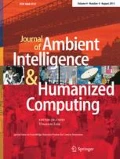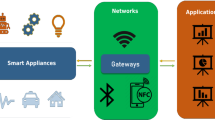Abstract
In this paper, the multi-objective grey wolf optimiser is utilised for the power scheduling problem (PSP). The grey wolf optimiser (GWO) is a recent swarm-based optimisation algorithm tailored for various optimisation problems. PSP is addressed by scheduling home appliances to a certain time horizon to minimise the electricity bill and peak-to-average ratio (PAR) and increase the comfort level of users. The multi-objective function is formalised and utilised in GWO to obtain an optimal schedule. Seven consumption profiles and seven real-time electricity prices with various characteristics are considered to evaluate the proposed multi-objective GWO. The performance of the proposed algorithm is tested against three factors, namely, electricity bill, PAR and user comfort level. The obtained schedule shows that all evaluation factors are optimally timetabled. For a comparative evaluation, the proposed method is firstly compared with the genetic algorithm. The proposed method exhibits and yield better performance than GA under the same consumption profiles. Secondly, the proposed method is compared with 19 state-of-the-art methods by using the recommended consumption profiles of these methods and their evaluation criteria. The proposed method nearly outperforms the compared methods in terms of minimisation of electricity bill and PAR. User comfort level is a criterion proposed in this study and has not been considered previously. It exerts a significant impact on the final schedule.


















Similar content being viewed by others
References
Ali W, Rehman AU, Junaid M, Shaukat SAA, Faiz Z, Javaid N (2017) Home energy management using social spider and bacterial foraging algorithm. In: International conference on network-based information systems. Springer, pp 245–256
Aman S, Simmhan Y, Prasanna VK (2013) Energy management systems: state of the art and emerging trends. IEEE Commun Mag 51(1):114–119
Asif S, Ambreen K, Iftikhar H, Khan H. N, Maroof R, Javaid N (2017) Energy management in residential area using genetic and strawberry algorithm. In: International conference on network-based information systems. Springer, pp 165–176
Azevedo JPC (2013) Effective scheduling of energy consumption in smart grids. FEUP—Dissertação
Batool S, Khalid A, Amjad Z, Arshad H, Aimal S, Farooqi M, Javaid N (2017) Pigeon inspired optimization and bacterial foraging optimization for home energy management. In: International conference on broadband and wireless computing, communication and applications. Springer, pp 14–24
BCU Commission (2017) Bcuc issues report to bc government on residential inclining block rates. http://www.bcuc.com/Documents/Proceedings/2017/DOC_49001_03-28-2017_BCUC-RIB-Rate-Report.pdf
CE Company (2017) Real-time pricing for residential customers. Retrieved from https://hourlypricing.comed.com/live-prices/
Faiz Z, Bilal T, Awais M, Gull S, Javaid N, et al., (2017) Demand side management using chicken swarm optimization, in: International conference on intelligent networking and collaborative systems. Springer, pp 155–165
Gao C, Chen S, Li X, Huang J, Zhang Z (2017) A physarum-inspired optimization algorithm for load-shedding problem. Appl Soft Comput 61:239–255
Gelazanskas L, Gamage KA (2014) Demand side management in smart grid: a review and proposals for future direction. Sustain Cities Soc 11:22–30
Gellings CW (1985) The concept of demand-side management for electric utilities. Proc IEEE 73(10):1468–1470
Hafeez G, Javaid N, Iqbal S, Khan FA (2018) Optimal residential load scheduling under utility and rooftop photovoltaic units. Energies 11(3):611
Iftikhar H, Asif S, Maroof R, Ambreen K, Khan H. N, Javaid N (2017) Biogeography based optimization for home energy management in smart grid. In: International conference on network-based information systems. Springer, pp 177–190
Javaid N, Javaid S, Abdul W, Ahmed I, Almogren A, Alamri A, Niaz IA (2017) A hybrid genetic wind driven heuristic optimization algorithm for demand side management in smart grid. Energies 10(3):319
Khan MA, Javaid N, Mahmood A, Khan ZA, Alrajeh N (2015) A generic demand-side management model for smart grid. Int J Energy Res 39(7):954–964
Logenthiran T, Srinivasan D, Shun TZ (2012) Demand side management in smart grid using heuristic optimization. IEEE Trans Smart Grid 3(3):1244–1252
Ma K, Yao T, Yang J, Guan X (2016) Residential power scheduling for demand response in smart grid. Int J Electr Power Energy Syst 78:320–325
Mechanics C (2014) Heating and air conditioning blog. Retrieved from http://www.climatemechanics.com/how-long-will-it-take-for-my-water-heater-to-heat-up/
Miao H, Huang X, Chen G (2012) A genetic evolutionary task scheduling method for energy efficiency in smart homes. Int Rev Electri Eng (IREE) 7(5):5897–5904
Mirjalili S, Mirjalili SM, Lewis A (2014) Grey wolf optimizer. Adv Eng Softw 69:46–61
Mohsenian-Rad A-H, Wong VW, Jatskevich J, Schober R (2010) Optimal and autonomous incentive-based energy consumption scheduling algorithm for smart grid. In: Innovative smart grid technologies (ISGT), 2010. IEEE, pp 1–6
Mohsenian-Rad A-H, Wong VW, Jatskevich J, Schober R, Leon-Garcia A (2010) Autonomous demand-side management based on game-theoretic energy consumption scheduling for the future smart grid. IEEE Trans Smart Grid 1(3):320–331
Muralitharan K, Sakthivel R, Shi Y (2016) Multiobjective optimization technique for demand side management with load balancing approach in smart grid. Neurocomputing 177:110–119
Peretto L (2010) The role of measurements in the smart grid era. IEEE Instrum Meas Mag 13(3):22–25
Pipattanasomporn M, Kuzlu M, Rahman S (2012) An algorithm for intelligent home energy management and demand response analysis. IEEE Trans Smart Grid 3(4):2166–2173
Qayyum F, Naeem M, Khwaja AS, Anpalagan A, Guan L, Venkatesh B (2015) Appliance scheduling optimization in smart home networks. IEEE Access 3:2176–2190
Rahim MH, Khalid A, Javaid N, Alhussein M, Aurangzeb K, Khan ZA (2018) Energy efficient smart buildings using coordination among appliances generating large data. IEEE Access
Rahim S, Javaid N, Ahmad A, Khan SA, Khan ZA, Alrajeh N, Qasim U (2016) Exploiting heuristic algorithms to efficiently utilize energy management controllers with renewable energy sources. Energy Build 129:452–470
Rasheed MB, Javaid N, Ahmad A, Khan ZA, Qasim U, Alrajeh N (2015) An efficient power scheduling scheme for residential load management in smart homes. Appl Sci 5(4):1134–1163
Rehman A. U, Aslam S, Abideen Z. U, Zahra A, Ali W, Junaid M, Javaid J (2017) Efficient energy management system using firefly and harmony search algorithm. In: International conference on broadband and wireless computing, communication and applications. Springer, pp 37–49
Sales G (2017) Home appliances power consumption. Retrieved from http://www.centralmainediesel.com/wattage-calculator.asp
Samadi P, Mohsenian-Rad H, Schober R, Wong VW (2012) Advanced demand side management for the future smart grid using mechanism design. IEEE Trans Smart Grid 3(3):1170–1180
Space B (2017) Home dehumidifiers. Retrieved from https://www.breathingspace.co.uk/dehumidifier-frequently-asked-questions-i62
Yearbook GES (2017) Statistical analysis for global energy. Retrieved from https://yearbook.enerdata.net/#energy-intensity-GDP-by-region.html
Yi W, Dong W (2015) Modeling and simulation of discharging characteristics of external melt ice-on coil storage system. Int J Smart Home 9(2):179–192
Zhao Z, Lee WC, Shin Y, Song K-B (2013) An optimal power scheduling method for demand response in home energy management system. IEEE Trans Smart Grid 4(3):1391–1400
Author information
Authors and Affiliations
Corresponding author
Additional information
Publisher's Note
Springer Nature remains neutral with regard to jurisdictional claims in published maps and institutional affiliations.
Rights and permissions
About this article
Cite this article
Makhadmeh, S.N., Khader, A.T., Al-Betar, M.A. et al. Multi-objective power scheduling problem in smart homes using grey wolf optimiser. J Ambient Intell Human Comput 10, 3643–3667 (2019). https://doi.org/10.1007/s12652-018-1085-8
Received:
Accepted:
Published:
Issue Date:
DOI: https://doi.org/10.1007/s12652-018-1085-8




